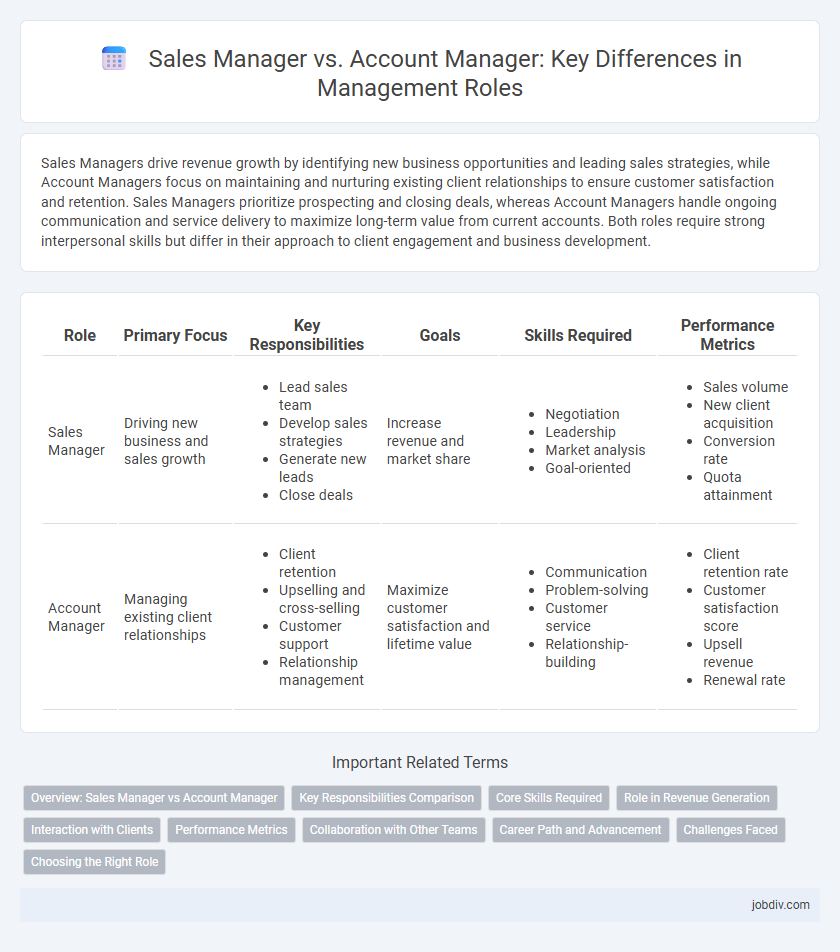Sales Managers drive revenue growth by identifying new business opportunities and leading sales strategies, while Account Managers focus on maintaining and nurturing existing client relationships to ensure customer satisfaction and retention. Sales Managers prioritize prospecting and closing deals, whereas Account Managers handle ongoing communication and service delivery to maximize long-term value from current accounts. Both roles require strong interpersonal skills but differ in their approach to client engagement and business development.
Table of Comparison
| Role | Primary Focus | Key Responsibilities | Goals | Skills Required | Performance Metrics |
|---|---|---|---|---|---|
| Sales Manager | Driving new business and sales growth |
|
Increase revenue and market share |
|
|
| Account Manager | Managing existing client relationships |
|
Maximize customer satisfaction and lifetime value |
|
|
Overview: Sales Manager vs Account Manager
A Sales Manager drives revenue growth by leading a team focused on acquiring new customers and meeting sales targets, while an Account Manager focuses on maintaining and expanding relationships with existing clients to ensure customer satisfaction and retention. Key performance indicators for Sales Managers often include sales volume, conversion rates, and market penetration, whereas Account Managers prioritize client retention rates, upsell success, and customer lifetime value. Both roles require strong communication and negotiation skills, but the Sales Manager is primarily growth-oriented, and the Account Manager is relationship-oriented.
Key Responsibilities Comparison
Sales Managers drive revenue growth by developing sales strategies, leading sales teams, and managing sales pipelines to secure new business opportunities. Account Managers focus on maintaining client relationships, ensuring customer satisfaction, and upselling or renewing contracts to foster long-term partnerships. Both roles require strong communication skills, but Sales Managers prioritize acquiring new customers while Account Managers emphasize client retention and service.
Core Skills Required
Sales Managers excel in negotiation, lead generation, and closing deals, driving revenue growth through strategic sales planning and team leadership. Account Managers focus on relationship building, customer retention, and personalized client service, ensuring long-term account satisfaction and upselling opportunities. Both roles require strong communication, problem-solving, and analytical skills, but Sales Managers prioritize sales targets while Account Managers emphasize client engagement and account development.
Role in Revenue Generation
Sales Managers primarily drive revenue growth by developing sales strategies, managing sales teams, and securing new business opportunities. Account Managers focus on maintaining and expanding existing client relationships, ensuring customer retention, and identifying upsell or cross-sell opportunities to maximize revenue from current accounts. Both roles are essential for a balanced revenue generation strategy, with Sales Managers targeting acquisition and Account Managers enhancing long-term value.
Interaction with Clients
Sales Managers concentrate on acquiring new customers and driving revenue growth through strategic outreach and lead generation. Account Managers focus on nurturing long-term client relationships by providing personalized service, addressing client needs, and ensuring customer satisfaction. Effective client interaction for Sales Managers involves persuasive communication and negotiation, while Account Managers prioritize trust-building and ongoing support.
Performance Metrics
Sales Managers are typically evaluated using performance metrics such as total revenue generated, sales growth percentage, and new client acquisition rates, highlighting their role in driving overall sales volume. Account Managers, on the other hand, are assessed based on client retention rates, customer satisfaction scores, and upsell or cross-sell success within existing accounts, emphasizing relationship management and long-term client value. Both roles contribute to business growth but focus on different aspects of the sales cycle and thus use distinct key performance indicators (KPIs) to measure success.
Collaboration with Other Teams
Sales Managers coordinate closely with marketing and product development teams to align sales strategies with market demands and product features. Account Managers collaborate intensively with customer service and technical support teams to ensure client satisfaction and seamless issue resolution. Effective teamwork between these roles and cross-functional departments boosts overall customer acquisition and retention rates.
Career Path and Advancement
Sales Managers typically progress from roles in sales and business development, advancing by demonstrating leadership in revenue growth and team management. Account Managers often build their careers through client relationship expertise, moving toward senior roles in client strategy and customer success management. Career advancement for Sales Managers emphasizes broader market impact and sales strategy, while Account Managers focus on deepening client partnerships and expanding account value.
Challenges Faced
Sales Managers often face the challenge of meeting aggressive revenue targets while motivating their teams to maintain high performance under pressure. Account Managers struggle with managing long-term client relationships, navigating complex client needs, and resolving conflicts to ensure customer satisfaction and retention. Both roles require balancing internal coordination and external stakeholder expectations in dynamic market conditions.
Choosing the Right Role
Selecting between a Sales Manager and an Account Manager role depends on whether the priority is driving new revenue through lead generation and closing deals or maintaining and expanding existing client relationships. Sales Managers focus on strategizing and motivating sales teams to exceed targets, whereas Account Managers emphasize client retention, personalized service, and upselling opportunities. Understanding organizational goals and personal strengths in sales strategy versus relationship management is crucial for optimal role alignment.
Sales Manager vs Account Manager Infographic

 jobdiv.com
jobdiv.com